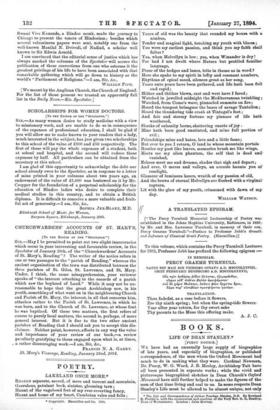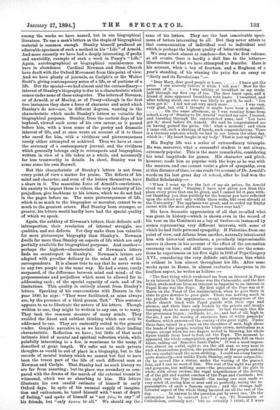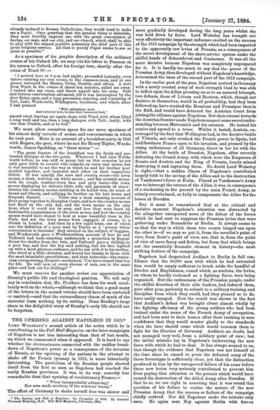BOOKS.
LIFE OF DEAN STANLEY.* [FIRST NOTICE.]
WE have had an unusually large supply of biographies of late years, and especially of biographies, or published correspondence, of the men whom the Oxford Movement had much to do in making what they were. Cardinal Newman, Dr. Posey, W. G. Ward, J. B. Mosley, Archbishop Tait have all been presented in separate works ; while the vivid and picturesque biographical sketches in Dean Church's Oxford Movement have still further helped to make the figures of the men of that time living and real to us. In some respects Dean Stanley's Life must be allowed to be almost unique, not only • The Life and Correspondence of Arthur Penrhyn Stanley, D.D. By Rowland E. Protbero. with the cooperation and sanction of the Very Rev. G..011. Bradley. Dean of Westminster. London : John Murray. among the works we have named, but in our biographical literature. To use a man's letters as the staple of biographical material is common enough. Stanley himself produced an admirable specimen of such a method in his " Life" of Arnold. And more recently we have had a deeply interesting, if prolix and unwieldly, example of such a work in Pusey's " Life." Again, autobiographical or biographical reminiscence we have in abundance. Cardinal Newman and Dean Church have dealt with the Oxford Movement from this point of view. And we have plenty of journals, as Carlyle's or Sir Walter Scott's, giving contemporary notes of a life, or of portions of a life. But the special—we had almost said the extraordinary— interest of Stanley's biography is due to a characteristic which comes under none of these categories. The letters of Newman, or of Arnold, or of Mozley, or of Pusey—though in the first two instances they show a force of character and mind which Stanley's do not—are, in different degrees, wanting in the characteristic which made Stanley's letters so valuable for biographical purposes. Stanley, from the earliest days of his boyhood, viewed each scene of his own career, as it passed before him, with a keen sense of the poetry and dramatic interest of life, and at once wrote an account of it to those who cared for him, with a vividness and picturesqueness rarely either attempted or achieved. Thus we have at once the accuracy of a contemporary journal, and the vividness which generally belongs only to retrospects and biographies, written in view of a life taken as a whole, and necessarily far less trustworthy in details. In short, Stanley was in some sense his own Boswell.
But this characteristic of Stanley's letters is not from every point of view a, matter for praise, The defects of his mind and character, and even of the letters themselves, have a share in it. The masculine force of Arnold's convictions, his anxiety to impart them to others, the very intensity of his prejudices, give backbone to his letters, which we do not find in the pages before us. The mere picturesqueness of life, which is so much to the biographer or narrator, cannot be so much to the greatest actors. Had Stanley been stronger, or greater, his letters would hardly have had the special quality of which we speak.
Again, the subtlety of Newman's letters, their delicate self- introspection, their revelation of internal struggle, are qualities, and not defects. Yet they make them less valuable for mere picturesque biography than Stanley's. Newman dwells far more than Stanley on aspects of life which are only partially available for biographical purposes. And another— perhaps the highest—characteristic of Newman's letters finds no counterpart in Stanley's. Newman's letters are adapted with peculiar delicacy to the mind of each of his correspondents. It is almost true to say that he never wrote to any two people in the same way. He had a sense, rarely surpassed, of the difference between mind and mind ; of the prepossessions and prejudices which must be allowed for in addressing each; of the special capacity of each, and of its limitations. This quality is entirely absent from Stanley's letters. Speaking of his conversations with Bunsen in the year 1840, he says : " They were facilitated, as mine always are, by the presence of a third person, Tait." This sentence appears to us to illustrate the nature of his letters. Though written to one, they might be written to any one, or to many. They took the common measure of many minds. They avoided the finest and subtlest thinking which can only be addressed to one. They are eminently suited to the general reader. Graphic narrative is, as we have said, their leading characteristic. Reflection we have ; but little of that most intimate kind of mental and spiritual reflection which, while painfully interesting to a few, is wearisome to the many, if described at great length. We refer not to such private thoughts as would be out of place in a biography, but to the records of mental history which we cannot but feel to have been the truest part of the life of such different men as Newman and Carlyle. That Stanley had no such history we are far from asserting; but its place was secondary as com- pared with the drama of the march of the external events he witnessed, which was so absorbing to him. His letters illustrate his own candid estimate of himself in early Oxford days. In spite of his unusual supply of imagina- tion and enthusiasm, he taxed himself with "want of depth of feeling," and spoke of himself as "not pAK to any" of his friends, but "only ammo; to all." We should say the
same of his letters. They are the best conceivable sped- mens of letters interesting to all. But they never attain to that communication of individual soul to individual soul which is perhaps the highest quality of letter-writing.
We may select almost at random—for, in the first volume, at all events, there is hardly a dull line in the letters— illustrations of what we have attempted to describe. Here is
his account, when a boy of fourteen, and a Rngbean of a year's standing, of his winning the prize for an essay on " Sicily and its Revolutions ":—
" Dear Mary, dear good people at home I have got the
prize. I can scarcely believe it while I tell you! Now for the account of it I was sitting at breakfast in my study, half through my first cup of tea. The door burst open, and a friend of mine appeared breathless with haste. I trembled, and after talking about one who was likely to get it, he said You
have got it.' I did not eat very much more I was very, very glad, but still I thought it might have been a mistake.
On the same afternoon, as I was running home from school, a cry of Stanley to Dr. Arnold' reached my ears. I turned, and bursting through the outstretched arms, and You have got it,' stood before Dr. Arnold. He said he congratulated me on having gained the prize. Oh ! what a moment ! and when I came out, such a shaking of hands, inch congratulations. There is a German sentence which we had in our lesson the other day, which is : My heart laughs in my body.' That is just my feeling?'
His Rugby life was a series of extraordinary triumphs. He was, moreover, what a successful student is not always, extremely popular. This is the more remarkable, considering his total inaptitude for games. His character and pluck, however, made him as popular with the boys as he was with the masters, and one cannot resist a glow of sympathy, even at this distance of time, as one reads his account of Dr. Arnold's words on his last great day at school, after he had won the Balliol Scholarship :- " When I went up for the last of my six prizes, Dr. Arnold stood up and said Stanley, I have now given you from this place every prize that can be given, and I cannot let it pass with- out thanking you thus publicly for the honour you have reflected upon the school not only within these walls, but even already at the University.' The applause was great, and so ended my Rugby career with the most glorious hour I have ever had."
His keen dramatic appreciation of all that re called what was great in history—which is shown even in the record of his tour on the Continent as a boy of twelve—is instanced by
scenes representing very different interests, with some of which he had little personal sympathy. If Palestine, from one point of view, and Athens from another, naturally intoxicated him with historical enthusiasm, a peculiarly impressionable- nature is shown in his account of the effect of the coronation ceremony on him ; and still more remarkable are the sensa- tions he experiences on his first sight in 1841 of Pope Gregory XVI., considering the very definite anti-Roman bias which is evident in him almost throughout his life. After some weeks spent in Rome, in almost exclusive absorption in its heathen aspect, he writes as follows :-
" The first thing which awakened me from an interest in Pagan to an interest in Christian Rome was the Catacombs, and the first which awakened me from an interest in Imperial to an interest in Papal Rome was the Pope. My first sight of the Pope was at S. Maria on the Feast of the Annunciation, when he goes there in state to give dowries to poor girls. There was nothing much in the prelude to his appearance, except the strangeness of the whole church lined with Papal guards with their caps and plumes, and their lines only broken by the priests and monks running about to make preparations. At last through this file the procession began ; cardinals, &c., &c., and last of all, high in the air, I saw the waving of enormous fans of white peacocks' feathers, which announced the coming of the great sight. Under these fans, raised in a chair on the shoulders of men, high above the heads of the people, wearing the triple crown, motionless as a, corpse, except when his two fingers moved in blessing, his whole figure visible from head to foot, sat the Pope. The moment he appeared, the whole congregation, guards and people, fell on their knees, calling out Benedice Santo Padre.' It was a most impres- sive, almost an awful, sight to see the old man so very near in such a tremendous position, the prostration of the people making his own exaltation all the more striking. I could see every feature quite distinctly—not unlike Uncle Stanley, only more corpse-like. On he moved like a statue, under the waving of the peacock fans, and I saw no more of him. The rest of the sight was pretty and gorgeous, but nothing more—the procession of the girls in white, with silver crowns, the regal magnificence of the driving off of the gilt and scarlet coaches of the Pope and Cardinals ; but the sight was the Pope himself—the seeing one man made so very much of, seeing him so near and so perfectly, seeing the re- presentative of such a famous system ; and the strange half- Oriental aspect of the whole thing haunted me all the rest of the day In answer to the question put by every one, 'Do the ceremonies tend to convert you ?' I say, To Romanism or Catholicism, certainly not ; ' but as certainly I think, if I were already inclined to Roman Catholicism, they would tend to make me a Papist. Once granting that the general thing is desirable, they most forcibly impress one with the great convenience of having one man, and one city, and one church, which shall be able to play with the utmost possible solemnity the chief part of this great religious service. All that is purely Papal seems to.me as great as possible."
As a specimen of his graphic description of the ordinary -events of his Oxford life, we may cite his letter to Pearson on his return to Oxford, after his foreign tour, shortly after the crisis of Tract 90 :- " I arrived here at 6 p.m. last night ; proceeded instantly, even before entering my own rooms, to the common-room, and at one glance surveyed the Master, Twigs, Donkin, and others. A note from Ward, in the course of about ten minutes, called me away. I rushed into my room, and threw myself into his arms. Fast and furious conversation advanced, till it was interrupted by the door flying open, and a long procession entering, and consisting of Tait, Lake. Woolcombe, Waldegrave, Goulburn, and which, after I had pressed
' With salutations meet, And reverent love, to kiss their honoured feet,' passed away, leaving me again alone with Ward, with whom Ijhad a long walk and tea, then a long dialogue with Tait; lastly, with our dear Donkin, and so to bed."
We must allow ourselves space for one more specimen of his almost daily records of scenes and conversations in which he took part. Here is an account of a breakfast-party in 1841 with Rogers, the poet, where he met Sir Henry Taylor, Words- worth, James Spedding, as "three mutes" :—
"The great feature of the breakfast was the lively and pro- tracted dialogue of the two poets. Whenever I had seen Words- worth before, he was stiff or prosy, but on this occasion he not only gave birth to several wise remarks on verse and metre, but it was beautiful to see the way in which he and his brother poet sported together, and bantered each other on their respective habits. It was exactly the town and country mouse—the town mouse, a sleek, well-fed, sly white mouse ; and the country mouse with its rough, weather-worn face and grey hairs—the town mouse displaying its delicate little rolls and pyramids of straw- berries, the country mouse exulting in its hollow tree, its crust of bread and liberty, and rallying its brother on his late hours and
;frequent dinners There was a most amusing account of their going together to Hampton Court, and how the country mouse had fixed on the only day, and the town mouse on the only hour, when it could not be seen, and how they were beset by 'fashionable acquaintances of the town mouse, and how the country mouse would have stayed to look at some beautiful trees in the Park, had not the town mouse been engaged, of course, to a dinner in London. And then by a few rapid leaps, one of which was the definition of a poor man by Taylor as a person whose conversation is tiresome,' they entered on the subject of beggars, and Wordsworth gave a Wordsworthian account of how he and Talfourd had been standing underneath a projection in Regent Street for shelter from the rain, and Talfourd gave a shilling to a poor boy, and how the boy said nothing, but his face lighted up with a most glorious radiance, and he ran with it to his mother, who stood at a little distance, and bowed her thanks to them with the most inimitable gracefulness ; and then Artevelde—the states- man overpowering the poet—exclaimed, 'You have ruined that boy for life. He will now, at every shower of rain, run to the same place and look out for shillings.."'
We must reserve for another review our appreciation of Stanley's public life and theological position. We will only say in conclusion that Mr. Prothero has done his work excel- lently well on the whole,—although we think that a good many of the letters in the second volume should have been curtailed or omitted,—and that the extraordinary charm of much of the material loses nothing by its setting. Dean Bradley's large share in the delightful story of Stanley's early life should not be forgotten.




















































 Previous page
Previous page